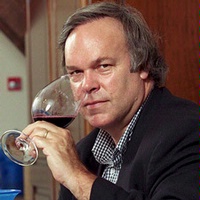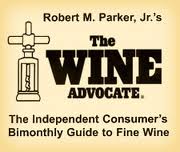The still relatively small world of wine journalism has been atwitter lately over the future of wine criticism. There has been both elation and angst, triggered by the news that the world’s most prominent wine critic, Robert Parker, had sold an interest in The Wine Advocate, his closely watched newsletter, to a group from Singapore.
 There is little doubt that Parker, at 65, is beginning to wind down a brilliant career. Prior to the sale, he had already announced he would narrow his focus to the areas that most interest him, Bordeaux and the Rhone Valley, two wine regions in France that owe a great deal of their current worldwide popularity to Parker’s palate and enthusiasm.
There is little doubt that Parker, at 65, is beginning to wind down a brilliant career. Prior to the sale, he had already announced he would narrow his focus to the areas that most interest him, Bordeaux and the Rhone Valley, two wine regions in France that owe a great deal of their current worldwide popularity to Parker’s palate and enthusiasm.
Reaction to the sale of The Wine Advocate and Parker’s retreat has been nothing if not curious. A new generation of wine journalists has long envied Parker’s influence, and loudly applauded what is seen in some circles as the end of the Parker era. One wine blogger, my colleague W. Blake Gray, has gone so far as to post odds on the "next" Robert Parker.
Not so fast. Over the past three decades, Robert Parker has been a kingmaker with his popular but controversial 100-point scale. He came to prominence in 1983 with audacious praise for the 1982 vintage of Bordeaux. He filled a void with reviews that were bold and provocative at a time when serious wine critics were few and far between, and wine writing in general was often little more than genteel puffery.
Parker was effusive about the wines he loved, but equally passionate and expressive when he took a chateau to task for underperforming. His style was bold, honest and refreshing, and it was quickly embraced by the wine trade as a tool to increase sales.
It was a time in America when solid information about wine was scant, although curiosity about wine was growing. France was dominant, but California was beginning to emerge in the market, and there was genuine need for a reliable voice consumers could trust.
Robert Parker was the right person in the right place at the right time. That world no longer exists.
 Today, largely due to the Internet, there is a cacophony of wine advice. A merchant looking to utilize a shelf-talker to promote sales of a particular wine now has multiple options. The Wine Advocate and to a lesser extent The Wine Spectator remain the preferred media in wine promotion, but the choice is no longer as clear-cut as it once was. Other voices have emerged and will continue to emerge.
Today, largely due to the Internet, there is a cacophony of wine advice. A merchant looking to utilize a shelf-talker to promote sales of a particular wine now has multiple options. The Wine Advocate and to a lesser extent The Wine Spectator remain the preferred media in wine promotion, but the choice is no longer as clear-cut as it once was. Other voices have emerged and will continue to emerge.
There are literally dozens of wine journalists with the talent and work ethic to be the next Robert Parker. But the day when one person can toss out a number and put an obscure winery on the map, or inspire a stampede at the checkout counter, is all but over.
When RP does finally retire, it will mark the end of an era — the Robert Parker era.
I wouldn’t look for another RP anytime soon.
8
